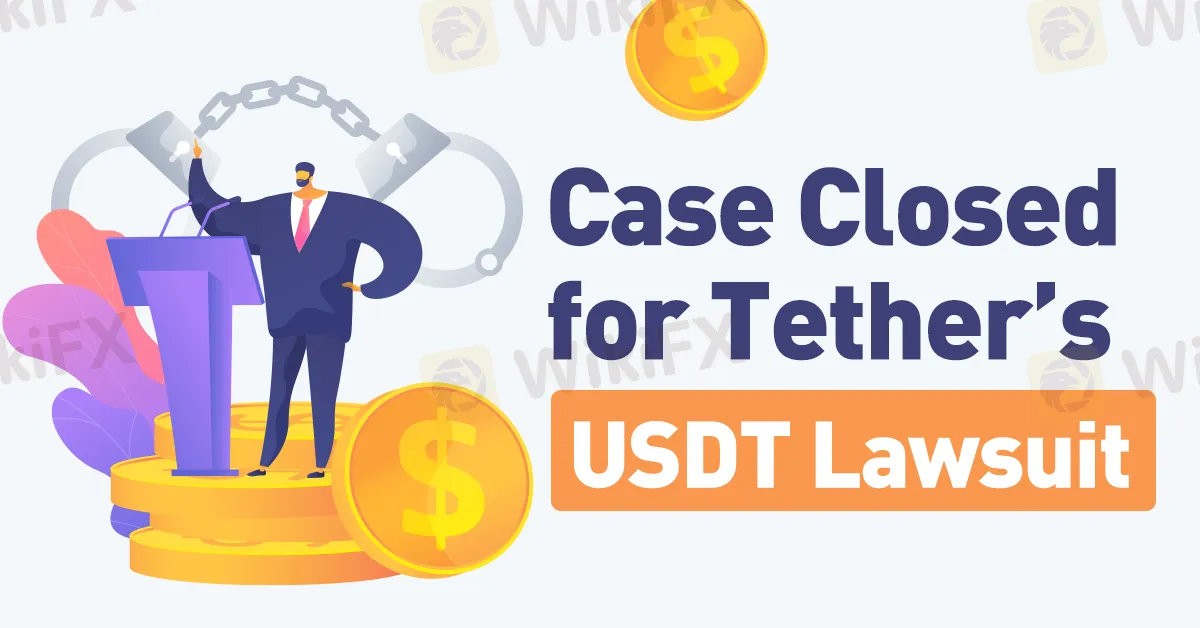简体中文
繁體中文
English
Pусский
日本語
ภาษาไทย
Tiếng Việt
Bahasa Indonesia
Español
हिन्दी
Filippiiniläinen
Français
Deutsch
Português
Türkçe
한국어
العربية
Case Closed for Tether’s USDT Lawsuit
Abstract:In a tangled legal showdown involving Tether and Bitfinex, the recent resolution in the court case raises intriguing questions about stablecoin security and alleged market manipulation within the cryptocurrency sphere.

The legal battle confronting Tether and Bitfinex has drawn to a close as the plaintiff chose not to contest the final court verdict, a resolution confirmed by Tether, the stablecoin issuer, in a recent statement.
The legal battle between Tether and Bitfinex has been a long and winding saga that has spanned multiple jurisdictions and involved a variety of allegations. Back in 2017, Shawn Dolifka and Matthew Anderson, the plaintiffs, accused Tether of misleading assertions regarding the USDT stablecoin's one-to-one backing by the U.S. dollar. Yet, the U.S. District Court for the Southern District of New York dismissed their claims in August, citing insufficient evidence of harm in the lawsuit.
Dolifka and Anderson contended that Tether lacked ample reserves matching the circulating USDT volume. They argued that the reserves extended beyond solely U.S. dollars, comprising over-collateralized loans and various assets, ultimately depreciating the stablecoins value.
Tether countered these claims by asserting a lack of solid evidence supporting any decrease in USDT's value. Consequently, the court favoured Tether, highlighting the lawsuits absence of factual substantiation for the alleged devaluation.

The lawsuit, cantering on Tethers misrepresentation of stablecoin backing, concluded as the plaintiff chose not to pursue further legal recourse, acknowledging the court's decision.
In response to the resolution, Tether criticized Dolifkas initial action as baseless and commended his withdrawal of the appeal. The stablecoin issuer reiterated its resilience against baseless litigation aimed at monetary gains.
Despite this legal victory, a New York judge previously mandated Tether and Bitfinex to disclose financial records concerning the stablecoin's backing. Additionally, Bitfinex sought dismissal of a lawsuit accusing them of market manipulation, labeling it as frivolous, but the court accepted the plaintiffs' requests for key financial documents.
A separate class-action lawsuit targets Bitfinex and Tether, alleging fraudulent inflation of the cryptocurrency market by issuing uncovered USDT tokens. The plaintiffs characterize this alleged sophisticated scheme as the “biggest bubble in human history.”

Disclaimer:
The views in this article only represent the author's personal views, and do not constitute investment advice on this platform. This platform does not guarantee the accuracy, completeness and timeliness of the information in the article, and will not be liable for any loss caused by the use of or reliance on the information in the article.
Read more

Gigamax Scam: Tracking Key Suspects in RM7 Million Crypto Fraud
Malaysian authorities are actively pursuing seven individuals linked to the Gigamax investment scam, which has defrauded investors of over RM7 million. The suspects include an Indonesian national, identified as Awaludin, who is believed to be the mastermind behind the scheme, and six Malaysians who served as promoters and speakers for the fraudulent operation.

Singaporean Arrested in Thailand for 22.4 Million Baht Crypto Scam
Thai authorities have apprehended a 32-year-old Singaporean man suspected of being part of a transnational syndicate involved in cryptocurrency scams. The group is accused of defrauding victims of more than 22.4 million baht (S$886,000) through a fraudulent trading platform.

Kraken and BitGo to Handle FTX Payouts Starting January 2025
Kraken and BitGo will oversee the first FTX payouts starting January 3, 2025. 98% of creditors receive at least 118% of their claims in cash.

FCA Seeks Input to Shape UK Crypto Market Regulations
UK FCA seeks public feedback on crypto rules to improve market transparency, protect consumers, and support growth. Comments are open until March 2025.
WikiFX Broker
Latest News
Geopolitical Events: What They Are & Their Impact?
Volkswagen agrees deal to avoid Germany plant closures
Top 10 Trading Indicators Every Forex Trader Should Know
TradingView Launches Liquidity Analysis Tool DEX Screener
MultiBank Group Wins Big at Traders Fair Hong Kong 2024
WikiEXPO Global Expert Interview: Simone Martin—— Exploring Financial Regulation Change
'Young investors make investment decisions impulsively to keep up with current trends' FCA Reveals
Why Do You Feel Scared During Trade Execution?
CySEC Settles Compliance Case with Fxview Operator Charlgate Ltd
Scope Markets Review: Trustworthy or Risky?
Currency Calculator


